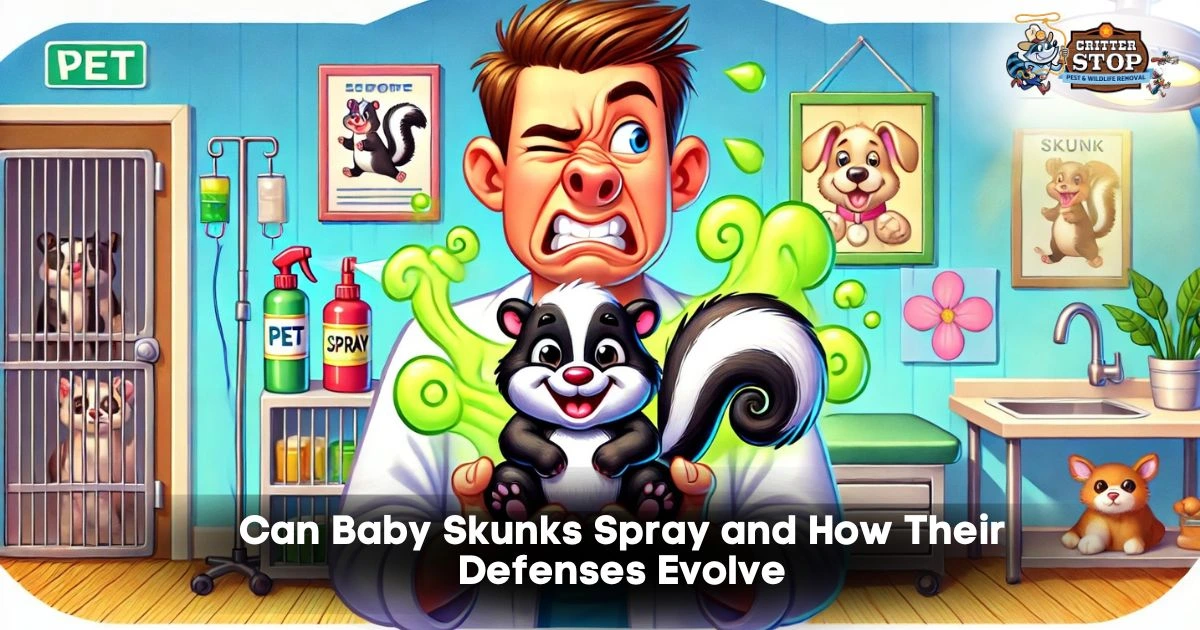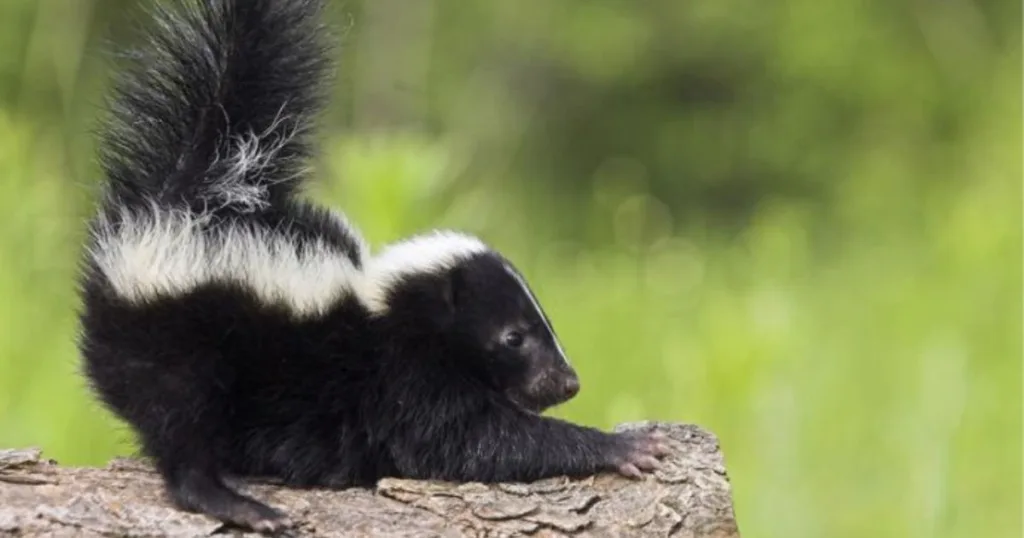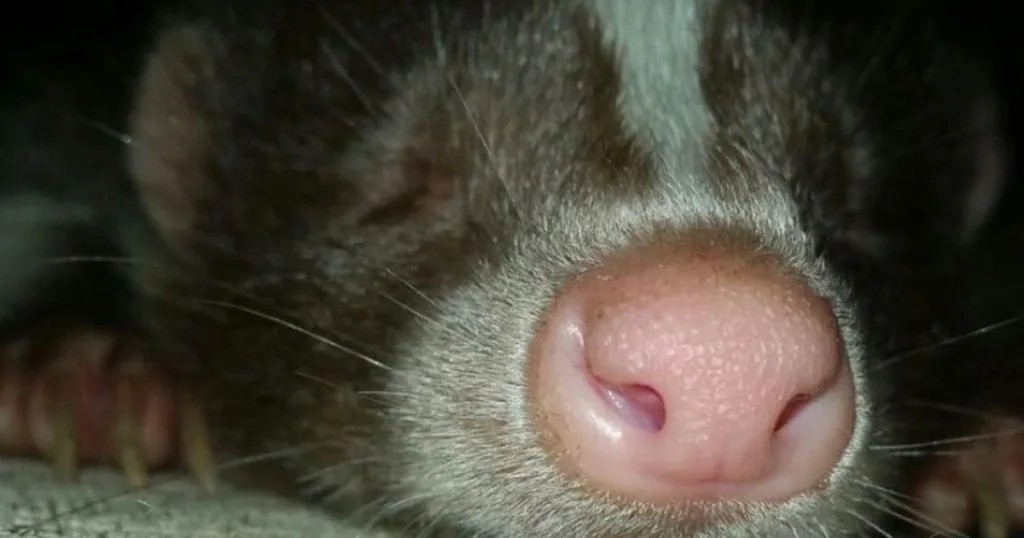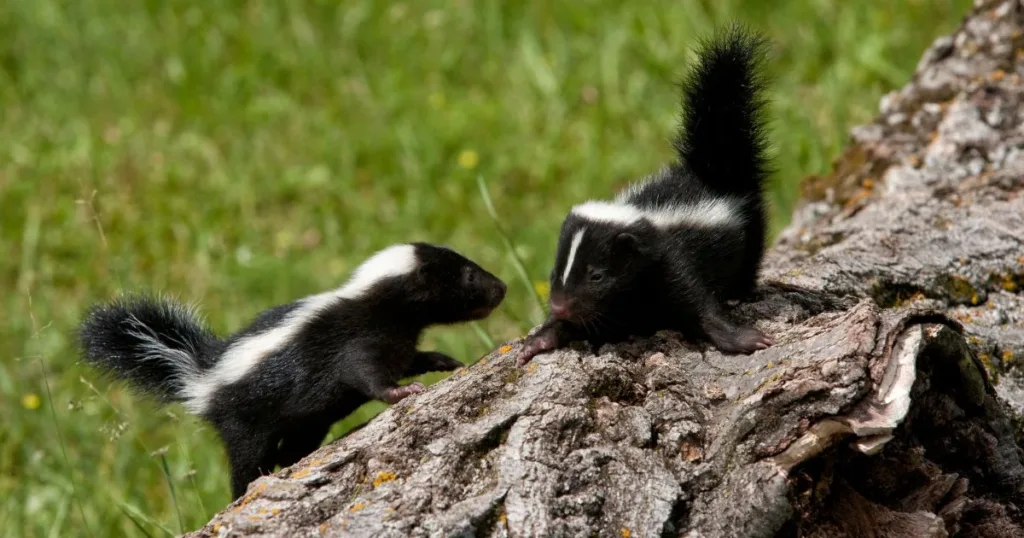
If you’ve ever wondered, can baby skunks spray? The answer is yes, but not immediately. Baby skunks are born with the ability to spray, but they typically don’t develop complete control or use their spray effectively until they are a few weeks old.
You should know that baby skunks usually start to spray around 2 to 3 weeks of age, once their glands are more developed. Until then, their spray is weak and less likely to be released in a defensive situation.
Understanding when baby skunks can spray helps you gauge the risk of encountering young skunks. Knowing this will prepare you to handle encounters safely and avoid surprises from even the smallest skunks.

Baby skunks develop their spraying ability over time, gradually gaining control of their defense mechanism. The timing and effectiveness of this ability depend on their physical growth and environmental factors.
Skunk kits are born blind and unable to spray. Their scent glands, which produce the spray, begin to develop during the first few weeks after birth. By about 4 to 6 weeks, the glands become functional, but baby skunks usually do not have complete control over spraying until around 8 to 10 weeks of age.
During this period, kits rely primarily on their mother for protection and do not effectively defend themselves against predators. You can expect that by the time a baby skunk is weaned, it will be able to spray, though often not as accurately or as forcefully as an adult.
While baby skunks can spray after about two months, their aim and spray volume are usually less precise than those of adults. Adults have stronger, more developed scent glands and muscular control, allowing continuous and targeted spraying.
Unlike juveniles, adult skunks can release multiple sprays in succession, often hitting a target from a greater distance. Baby skunks may only manage small, less controlled bursts and require practice and maturity to become proficient defenders.
The spraying ability of baby skunks depends on several factors. Genetics influence gland size and strength, while nutrition affects gland development and muscle control. Stress and frequent threats can also accelerate learning to spray.
Handling or separating kits from their mother too early may delay effectiveness, as they learn defensive behaviors by observing their mother. Environmental exposure shapes their confidence and timing in using the spray. You should understand that not all baby skunks spray immediately when threatened.

Baby skunks can spray, although their ability and accuracy improve as they grow. Their spraying serves specific purposes related to defense and communication, which you should understand if you encounter them.
Baby skunks use their spray mainly to protect themselves from threats. When they feel cornered or scared, they release a strong-smelling liquid from glands near their tail. This spray is a chemical deterrent designed to discourage predators.
Unlike adults, baby skunks may not always aim their spray accurately. Their defense mechanism is initially less controlled but still effective enough to repel many animals. You should expect that baby skunks will use this spray reflexively rather than with precision.
Before spraying, baby skunks often display clear warning signs. They may stomp their feet, raise their tail, or emit a hissing noise to signal distress. These behaviors are meant to give you or a predator a chance to move away.
You can avoid being sprayed by noticing these signs and retreating calmly. However, if these warnings are ignored, baby skunks will spray as a last resort. Their defense is instinctive, not aggressive, but very effective.
If you encounter a baby skunk, know that it can spray and cause a persistent, unpleasant odor on you or your pets. This spray can be difficult to remove and may alarm pets, causing them to react unpredictably.
Keep pets away from baby skunks to prevent potential spraying incidents. If sprayed, wash the affected skin and pet fur with an appropriate cleaning solution designed to neutralize skunk odor. Being cautious helps avoid stressful encounters for both you and the animals involved.

If you have baby skunks on your property, it's essential to know when they can spray. Baby skunks start to develop the ability to spray at about three weeks old. Before this age, they generally cannot spray, but by six to seven weeks, they can defend themselves like adults.
You should act quickly once skunks become mobile and start spraying. Their presence on your property can lead to unpleasant odors and potential damage. Removing them humanely before they fully mature and become more agile spray users is the safest approach.
To encourage skunks to leave, remove food sources such as pet food, fallen fruit, and accessible garbage. Make sure outdoor areas are clean and well-lit. You can also seal off entry points to sheds, decks, or crawl spaces to prevent them from nesting.
Signs you should look out for:
| Sign | Description |
| Skunk burrows in yard | Holes near foundations or decks |
| Strong skunk odor | Persistent foul smell in the area |
| Sightings of mother and young | Especially at night or dawn |
If you have concerns about can baby skunks spray or when can baby skunks spray, you do not have to face it alone.
Critter Stop offers professional, humane wildlife removal services. They have earned a strong reputation and excellent customer feedback by consistently delivering high-quality work and exceptional service.
Contact Critter Stop at (214) 234-2616 for a complimentary inspection and expert assistance with removing skunks or other wildlife from your property.
Baby skunks do not spray immediately after birth. Their ability to spray develops over several weeks as their glands mature and they gain control over their muscles.
You cannot expect baby skunks to spray right after birth. They usually need about 6 to 8 weeks to develop the ability. Their spray glands and control improve as they grow.
Very young baby skunks generally cannot spray accurately or forcefully. They might release a mild odor if frightened, but this is not a fully developed spray. Accurate spraying requires muscle control that is developed over time.
If baby skunks grow up without their mother, they still develop the ability to spray around the same 6- to 8-week period. Lack of maternal care may slow development, but it does not prevent the growth of spray capability.
Baby skunks usually begin to spray defensively between 6 and 8 weeks old. This is when their glands and muscles are strong enough to produce a controlled spray. Before then, they mainly relied on hiding.
You know, baby skunks can spray when they start showing controlled gland contractions and release a strong odor. This typically happens between 6 and 8 weeks. Previously, their spray was weak or absent.
Visit our Critter Library and learn more about our furry friends